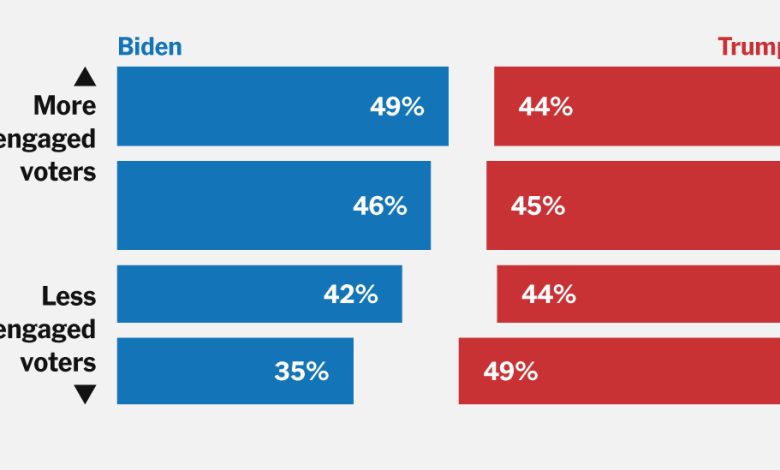Republicans and Democrats Are Trading Places on Turnout

Supported by
SKIP ADVERTISEMENT
Republicans and Democrats Are Trading Places on Turnout
In a reversal of one of the most familiar patterns in American politics, it appears that Donald J. Trump, not President Biden, would stand to gain if everyone in the country turned out and voted.
In New York Times/Siena College polls over the last year, Mr. Biden holds a wide lead over Mr. Trump among regular primary and midterm voters, yet he trails among the rest of the electorate, giving Mr. Trump a lead among registered voters overall.
The pattern is the latest example of how the Trump brand of conservative populism has transformed American politics. His candidacy galvanized liberals to defend democracy and abortion rights, giving Democrats the edge in low-turnout special and midterm elections. Yet at the same time, early polls suggest, many less engaged and infrequent voters have grown deeply dissatisfied with Mr. Biden.
The disengaged voters do not necessarily like Mr. Trump, the polling shows. But they’re motivated by pocketbook issues, more desiring of fundamental changes to the political system, and far less concerned about democracy as an issue in the election. Many low-turnout voters — notably including many who consider themselves Democrats — now say they’ll back Mr. Trump.
This unusual turnout dynamic is one of the central forces shaping the 2024 campaign. It helps explain why recent polls and election results seem so divergent, and why Mr. Trump has gained among young and nonwhite voters, who are less likely to vote than older white voters. It creates a challenge for the campaigns, who are finding that time-tested strategies for mobilizing irregular voters may not work quite the same way as they did in the past.
With five months to go until the election, there’s still time for less engaged voters to tune in and swing back toward Mr. Biden. Many infrequent voters aren’t yet tuned into the race, and their preferences appear highly volatile. If the polls are right, they’ve swung 20 percentage points since 2020, but some changed their answers when re-interviewed in the wake of Mr. Trump’s felony conviction in New York. Even if Mr. Trump holds his edge among the disengaged, it’s not clear many of these low-turnout voters will ultimately show up to vote.
